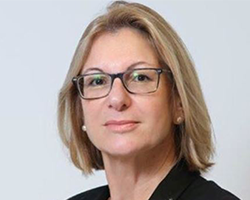“Nurses are the heart of our health-care system”: Shoshy Goldberg, Government Chief Nursing Officer, Israel

Shoshy Goldberg
“I want nurses to be strong and independent, to lead and be involved at all levels of decision-making,” says Government Chief Nursing Officer (GCNO) Shoshy Goldberg, from the Israeli Ministry of Health.
“As GCNO, I am responsible for 70 000 nurses in the country and provide the government with a detailed overview of the state of nursing. I oversee the regulation of the nursing profession, including licensing, certification of training institutions and study programmes, and curricula to expand nurses’ responsibilities and areas of expertise.”
From nurse practitioner to educator to leader
“I graduated as a registered nurse in 1980 and then proceeded to complete a bachelor’s in nursing, 2 master’s degrees and a PhD. I worked several years in a surgical department, spent more than 10 years as a teacher and manager of the nursing school I myself had once graduated from, and then worked as director of nursing services at the largest hospital in the country.
“I started my current role at the Ministry of Health 3 years ago, where I combine my management and leadership skills with the knowledge of nurses’ needs and their training. Being part of the decision-making system as GCNO, means assisting nurses to break the barriers that are limiting their scope of practice and to have their voices heard by the government.”
At the heart of the health-care system
“It is our mission to promote the profession of nursing, which is at the heart of the health-care system and is essential to cope with today’s challenges and those of the future.
“We work hard to enable nurses to reach their full potential, encouraging professional training opportunities geared towards positions of authority and responsibility. We want to make sure people get the best possible care from our nurses. I believe our efforts are what led the government to task me with overseeing all health-care professionals during the current COVID-19 pandemic.
“This involves much planning, the ability to foresee the needs that will arise and setting up what is required to meet those challenges. My team and I work tirelessly to ensure that should the situation worsen, we are prepared for the worst-case scenarios.”
Nurses are stepping up, assisted by technology
“The challenges posed by the COVID-19 pandemic have given us the opportunity to focus on teamwork, to showcase the added value of nurses and their central role in patient treatment. Nurses are proving their reliability and that they can take on additional responsibilities.
“No one is refusing to work, despite the danger they put themselves in – in fact, we received more than 12 000 applications from student volunteers, who want to be part of the efforts.
“To limit the possibility of infection, we are making use of innovative measures, such as the use of technological devices which allow nurses to monitor a patient’s condition remotely. Without having to enter patients’ rooms, nurses can measure their temperature and other vital signs.”
We stand united
“There have been expressions of solidarity from everyone in society. People are ‘adopting’ families of health-care workers, who work long shifts and find comfort in knowing someone is taking care of their loved ones.
“Health-care workers take care of one another too – they call sick colleagues twice a day, offer psychological and emotional support, and share the lessons they have learned on our daily conference calls and phone chat groups. We are all united in our efforts.
“I am thankful for the nurses’ courage and the population’s trust and confidence in us.”



